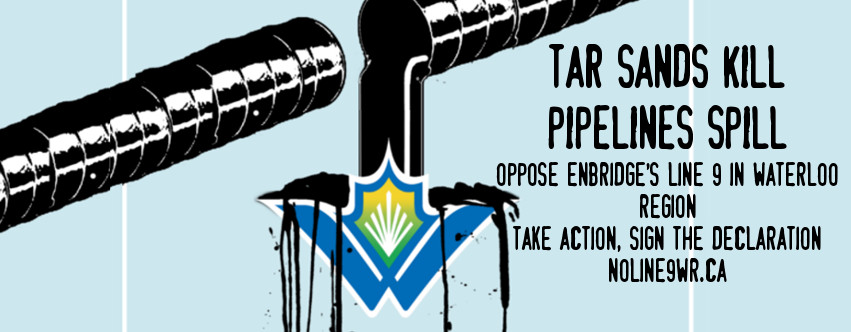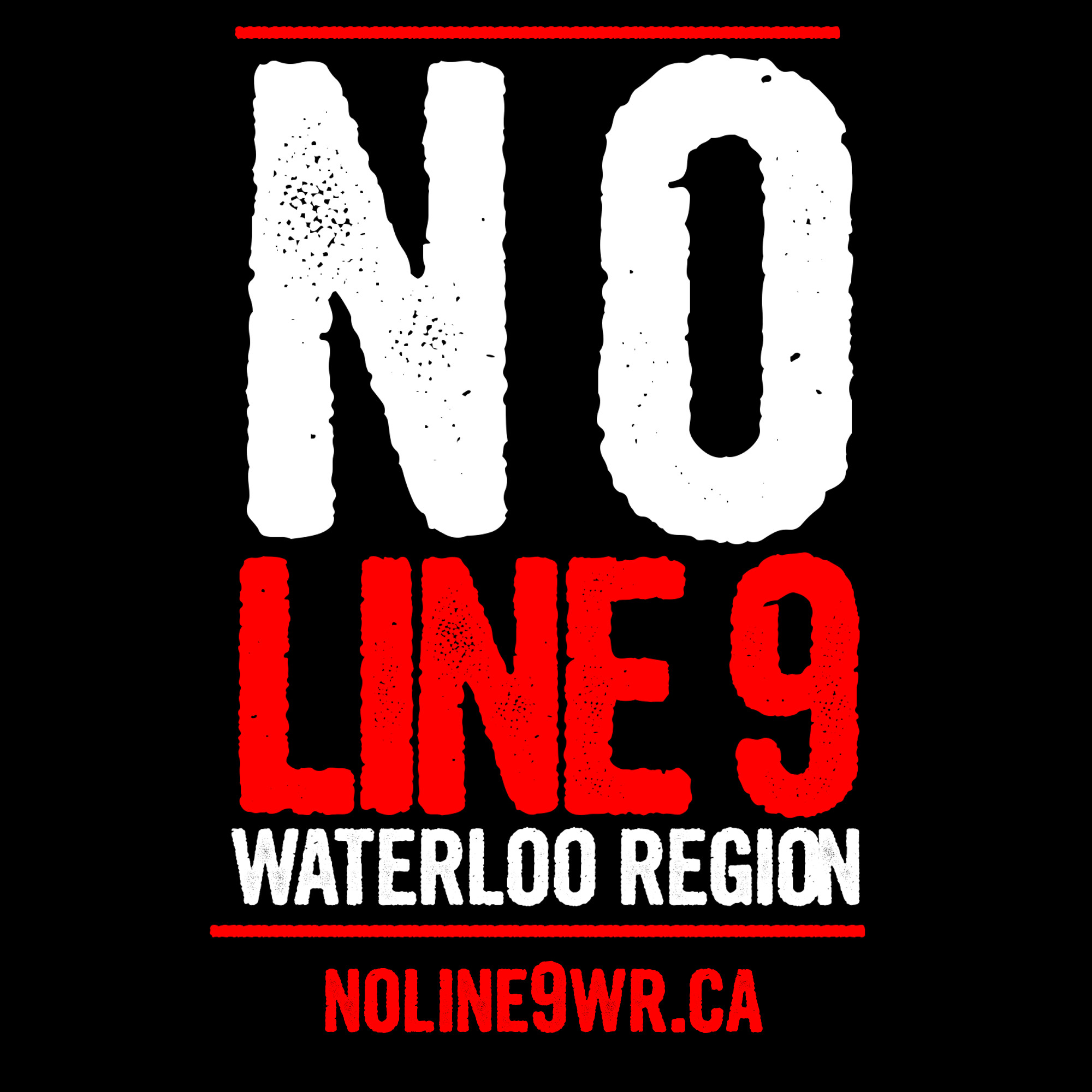Submitted by noline9 on
Waterloo Region campaigners have prepared the following declaration against the line 9 reversal.
Individuals can sign the online petition (which is the exact same text as the declaration below).
If you would like to sign on as an group/organisation, an artist, or a professor, please contact us at waterlooregionagainstline9@gmail.com
We are collecting these endorsements to bring them to the Region of Waterloo, the Grand River Conservation Authority, and the National Energy Board.

Preamble
Line 9 is a 38-year-old pipeline that has been transporting light crude oil between Montreal, Quebec, and Sarnia, Ontario. The pipeline runs through hundreds of communities, the territories of many Indigenous nations, and dozens of watersheds, including the Grand River. Enbridge Inc. has applied to reverse the flow of the pipeline and send diluted bitumen (dilbit), a form of heavy crude from the tar sands, through Line 9. This will threaten life around and downstream from the pipeline.
Line 9 was not built to withstand the transport of diluted bitumen, a toxic compound that poses a particularly dire threat to communities and ecosystems. In 2010, a break in the nearly identical Enbridge pipeline in Kalamazoo, MI, caused the largest inland oil spill in American history, which the company is still struggling to clean up three years later. When Enbridge proposed essentially the same project as the Line 9 reversal in 2008, under the name Trailbreaker, it was successfully opposed based on safety concerns. Just because Enbridge is currently seeking approval for the project piece by piece—the reversal of the first half last year, and the second half plus the transport of bitumen this year—there is no reason for us to accept it now. The threats remain just as serious.
We the Undersigned Declare Our Opposition to the Reversal on These Grounds:
1) The transport of bitumen through this pipeline poses a terrible risk to the Grand River and the surrounding watershed. We all rely on the watershed to sustain life within this region, but given Enbridge's track record of pipeline spills, leaks, and failures, Line 9 will put the shared environment and collective health of our region in jeopardy. If we let this reversal happen, we are endangering drinking water for this Region, as well as that of every community downstream on the Grand River.
2) Reversing Line 9 will provide no benefits to the Waterloo Region or local residents. It will not create jobs or provide new sources of energy for the municipality; local industry is not supported by the pipeline, and the bitumen passing through the pipeline will be shipped to markets in the United States and overseas. Yet, were a spill to occur, it would threaten the land on which our food is grown, and the rivers and aquifers from which our drinking water is drawn. This reversal poses a great risk to farms, small businesses, public institutions, rural and urban communities alike, and to our economy overall.
3) The reversal of the pipeline violates current treaties with Indigenous communities, both within the Haldimand Tract and elsewhere along the route. There has been no free, prior, and informed consent from these communities with regard to this pipeline project, which already cuts through their lands and territories. As residents on the Haldimand Tract (Six Nations’ Grand River Territory) it is crucial that we respect and act on this responsibility to consult.
4) Bitumen is more difficult and expensive to clean up than conventional crude. Recent spills like the one in Kalamazoo, MI, are evidence that Enbridge’s clean-up process and safety procedures have been woefully inadequate in dealing with the inevitable release of toxic tar sands bitumen. Given Enbridge’s track record of 800 significant pipeline spills in the past 15 years alone, we can expect spill incidents along Line 9. It is not a question of if but when this will happen here. Enbridge expects local responders to take responsibility in such emergencies. Thus, the cost of clean-up for a pipeline failure would result in increased financial burdens on local government, and would tax the capacity of our emergency responders.
5) The reversal will further entrench our region in the carbon economy, which contributes to climate change. This will lead to more frequent and devastating natural disasters. Pipeline projects like Line 9, the Keystone XL, and Northern Gateway, support the expansion of the Alberta tar sands industry. We envision a future where our lives and economies are not dependent on fossil fuels and do not contribute to the greenhouse gases and additional pollutants they produce. We recognize that supporting further extraction from the tar sands and other fossil fuel energy sources will continue to prevent the development of real sustainable alternatives.
Group Signatories (as of September 18th):
Alliance Against Poverty
Alternatives Journal
Anti-Colonial Working Group
Arc Cloathing Co.
Café Pyrus
CKMS 100.3 Sound FM
Common Cause KW
Community Renewable Energy Waterloo (CREW)
Kitchener Ontario Animal Liberation Alliance (KOALA)
KW Just Minerals Campaign
KW Occupy
KW Solidarity Network
Grand River Indigenous Solidarity
Grand River Media Collective
Laurier Students’ Public Interest Research Group
National Farmers Union Local 340
Poverty Makes Us Sick
Rebel Time Records
Reduce the Juice
The SPOT Collective
Stop the Tar Sands KW
Transition KW
UW Redpath Society
Waterloo Public Interest Research Group
Winstanley Solutions
- Log in to post comments



